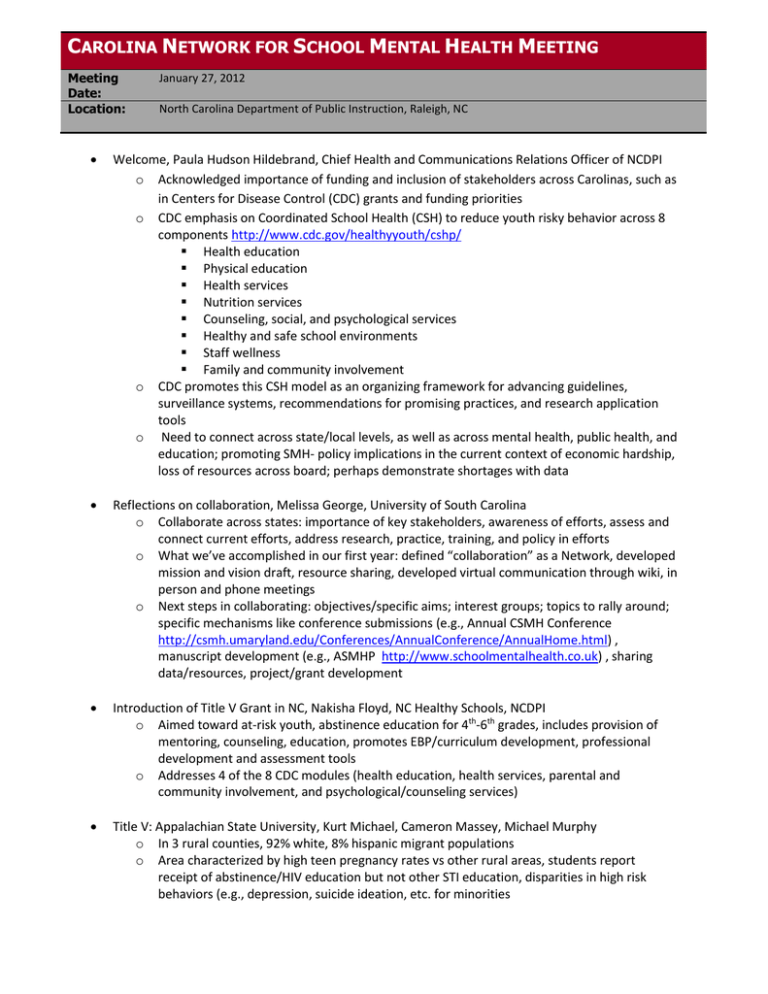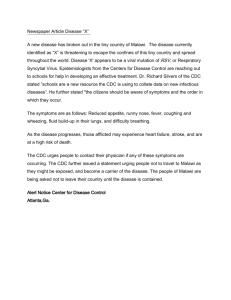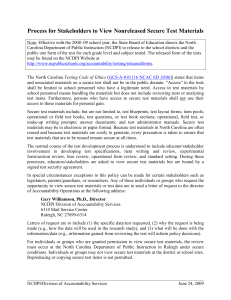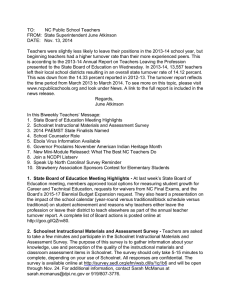January 2012 Meeting Notes - The Carolina Network for School
advertisement

CAROLINA NETWORK FOR SCHOOL MENTAL HEALTH MEETING Meeting Date: Location: January 27, 2012 North Carolina Department of Public Instruction, Raleigh, NC Welcome, Paula Hudson Hildebrand, Chief Health and Communications Relations Officer of NCDPI o Acknowledged importance of funding and inclusion of stakeholders across Carolinas, such as in Centers for Disease Control (CDC) grants and funding priorities o CDC emphasis on Coordinated School Health (CSH) to reduce youth risky behavior across 8 components http://www.cdc.gov/healthyyouth/cshp/ Health education Physical education Health services Nutrition services Counseling, social, and psychological services Healthy and safe school environments Staff wellness Family and community involvement o CDC promotes this CSH model as an organizing framework for advancing guidelines, surveillance systems, recommendations for promising practices, and research application tools o Need to connect across state/local levels, as well as across mental health, public health, and education; promoting SMH- policy implications in the current context of economic hardship, loss of resources across board; perhaps demonstrate shortages with data Reflections on collaboration, Melissa George, University of South Carolina o Collaborate across states: importance of key stakeholders, awareness of efforts, assess and connect current efforts, address research, practice, training, and policy in efforts o What we’ve accomplished in our first year: defined “collaboration” as a Network, developed mission and vision draft, resource sharing, developed virtual communication through wiki, in person and phone meetings o Next steps in collaborating: objectives/specific aims; interest groups; topics to rally around; specific mechanisms like conference submissions (e.g., Annual CSMH Conference http://csmh.umaryland.edu/Conferences/AnnualConference/AnnualHome.html) , manuscript development (e.g., ASMHP http://www.schoolmentalhealth.co.uk) , sharing data/resources, project/grant development Introduction of Title V Grant in NC, Nakisha Floyd, NC Healthy Schools, NCDPI o Aimed toward at-risk youth, abstinence education for 4th-6th grades, includes provision of mentoring, counseling, education, promotes EBP/curriculum development, professional development and assessment tools o Addresses 4 of the 8 CDC modules (health education, health services, parental and community involvement, and psychological/counseling services) Title V: Appalachian State University, Kurt Michael, Cameron Massey, Michael Murphy o In 3 rural counties, 92% white, 8% hispanic migrant populations o Area characterized by high teen pregnancy rates vs other rural areas, students report receipt of abstinence/HIV education but not other STI education, disparities in high risk behaviors (e.g., depression, suicide ideation, etc. for minorities o o Develop needs assessment of community attitudes and perceptions about MH, teen pregnancy, high school dropout, etc.; focus groups to get perceptions of peer behaviors and attitudes ASU’s Assessment Support and Counseling (ASC) Center: SMH services, grant-funded, graduate student infrastructure Title V: Eastern Carolina University, Jeannie Golden, Ashley Bouknight Wingard, Albee Ongsuco o Focus on health promotion, service provision in rural middle schools (high ethnic minority and low income), grant-funded, teaming of school social workers (present mostly in Eastern NC) and nurses for service delivery, emphasize importance of physical health for MH o Additional teaming with other supports, like “child and family supports” and “student studies groups” to identify at-risk students, providing instructional support and strategies, focus on family inclusion and instructional content for families through workshops NCDPI Team Module: Understanding Student Behavior in the Classroom Karen Everett, Jessica Gerdes, Darlene Johnson, Christina Minard, DeLea Payne, Cheryl Posner-Cahill, Jennifer Rothman, Paul Savery http://center.ncsu.edu/nc/ o Online course for educators’ professional development training, based on needs assessment, goal: to teach educators about issues that contribute to student performance in the classroom o Developed by collaborative across school nurses, school psychologists, school social workers, public health and substance use specialists, school resources officers, juvenile justice officials, NAMI and DPI to develop sections of the curriculum o Easy access, ease of technology, provides CEUs, free of charge, development of it through collaborative team, entirely voluntary, will be designing new modules Management of Mood Disorders in SMH, Eric Youngstrom, UNC Chapel Hill o Research on Bipolar and mood disorders has rapidly changed over last 20 years such that current practitioners are not adequately trained with up to date information to identify or treat disorders o Issues with getting the research on BPD disseminated, EB tools and techniques exist but not being used, challenging to get into schools, current practice is out of date o National movement in BPD dissemination but little occurring in NC and SC o Suggestions for promoting research to practice: focus groups with principals, get schools on board, validate school personnel experience, address barrier as schools treat behavior not MH, connect with school MH clinicians, getting the word out through such presentations, social networking, etc., models for training the trainers, creating toolkit of resources for practitioners, approaching school districts/principals for support to promote utilization Group Discussion Themes o Economic strain on schools: implications for sustainability of programs and need for workforce development o Moving from “Center” to “Network”: perception of other networks as practitionerfocused/or led; we are moving toward university-community driven, focus on partnerships, utilizing academic settings is important for sustainability o Current NC collaborative across systems of care: NC Collaborative for Child, Youth & Families http://nccollaborative.org o o o o o o o As a state, SC has been behind in moving from state run to managed health care which perhaps has been a positive; although major cuts of up to 40% over last 3 years Importance of community partnering with universities, e.g., in SC DMH’s partnering with USC, need for additional SC universities Identified barrier from other collaborations: a lack of knowing what to do, they show up and just share updates, and don’t do anything In NC there appears to be available funds that aren’t being used/trickling down, such as in NC Public and Mental Health Importance of mental health and substance abuse connections, a lack of support for youth with substance use needs (data showing 45% of youth with MH needs not being served, while 91% of youth with substance use needs not being served- only being served in juvenile justice) Important to consider why there is a lack of service provision (limited access, too few providers)? Underinsured/ and uninsured comprise the greatest proportions of youth not receiving services in NC; many programs losing funding for providing services in schools and those uninsured then can’t receive treatment, “risky” for schools to take on this work, need to focus on gaining buy-in from schools Panel Discussion and Future Plans o Who do we still need to bring on board? NC education and academics, SC dept of Ed, SC NAMI, SC Social Work, SC educators, school personnel, school and community practitioners, government/retired politicians, legislators o Good to see our progress o Importance for bridging research to practice gap o What we’re talking about isn’t new, focus on systems, relationship-building, monitoring relationships and communication (language), and monitoring what happens when we are together, what we accomplish, where we are going o Relationships and systems for sustainability o SMH cannot be merely doing MH in schools, willingness to evolve o Next meeting: in Greenville, SC, end of August, doodle poll Importance of sustainability and systems as topic on agenda Other topics for consideration: trauma, supporting teachers (reduce stress and promote MH), connecting to teachers and families Importance of community-building although it’s usually first to be cut











